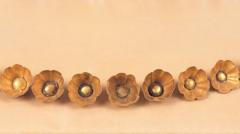The National Museum of Sudan, a symbol of the country's rich history, has suffered extensive damage due to war-related looting and violence. Tens of thousands of artifacts are believed to be destroyed or missing as the conflict wreaks havoc on cultural institutions, with calls for recovery efforts gaining urgency amid the ongoing crisis.
The Cultural Catastrophe: Sudan's Museums Devastated by War

The Cultural Catastrophe: Sudan's Museums Devastated by War
Two years of conflict have left Sudan's National Museum and its cultural heritage in tatters, with priceless artifacts lost to looting and destruction.
In the heart of Khartoum, the Sudan National Museum once stood as a testament to the nation's proud heritage, showcasing stunning artifacts from Nubian civilizations and exquisite Christian artworks. Yet, in the wake of a brutal war that erupted two years ago, many of these historical treasures have been lost to theft and destruction. The military has regained control of the capital, but the damage inflicted on cultural sites like the museum is both staggering and disheartening.
Prior to the conflict, the National Museum was a vibrant gathering space for locals and tourists alike, witnessing school trips and cultural events amidst its rich collections. As the brutal fighting unfolded, the museum became a target. Recent inspections reveal shattered glass, casings from bullets scattered across the floor, and evidence of extensive looting. Over the last two years, officials estimate that countless artifacts have either vanished or been sold off during the RSF's (Rapid Support Forces) control of the area.
"The militia has dismantled our identity by stripping us of our history," laments Ikhlas Abdel Latif Ahmed, director of museums at the Sudan National Corporation for Antiquities and Museums, emphasizing the profound loss experienced by a nation steeped in cultural legacy. Before warfare marred the landscape, the museum was undergoing restoration, which inadvertently facilitated the removal of its treasures. Suspicions abound that looted items may have made their way to the United Arab Emirates, where the RSF has previously been linked to illicit gold trading.
Ahmed recalls the treasures housed within the museum: a gold collar from the pyramid of King Talakhamani, a remarkable artifact from the 5th Century BC, now unaccounted for. As officials strive to retrieve looted collections, the threat of renewed violence compounds the challenge, with many calling the looting not just criminal but a calculated effort to erase Sudan's profound historical identity.
With nearly 13 million people displaced due to the ongoing conflict and over 150,000 lives lost, the war is a dire humanitarian crisis that extends beyond physical destruction, aiming to sever cultural ties between the people and their rich heritage. Amid this turmoil, Ahmed remains hopeful for the future of the National Museum and its invaluable collections, expressing a desire to reconstruct it into a space even more beautiful than before. "Inshallah, we will recover all our collections," she asserts with a vision to restore not just the museum but the spirit of Sudan's history.



















